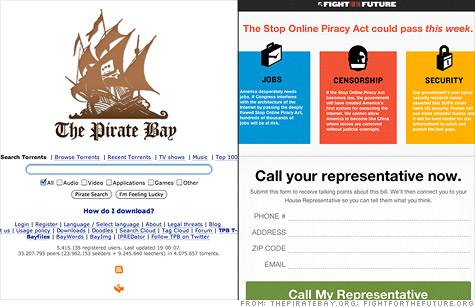Search News

SOPA's backers say the sweeping anti-piracy bill is needed to squash sites like The Pirate Bay (left), but the tech industry says the bill is rife with unintended consequences.
NEW YORK (CNNMoney) -- A congressional vote on an anti-piracy bill that Internet heavyweights like Google say would be an online Armageddon has been delayed until 2012.
The Stop Online Piracy Act (SOPA), which was introduced in the House of Representatives in late October, aims to crack down on copyright infringement. Its targets include "rogue" overseas sites like torrent hub The Pirate Bay, which essentially operate as a free bazaar for illegal downloads of movies, music, TV shows and other digital content.
The legislation has turned into a Hollywood-vs-Silicon Valley battle royale, with media companies uniting in favor of it and tech's power players throwing their might into opposing it.
A House of Representatives committee met last week to discuss proposed amendments to the bill, a process that must be completed before the committee can decide whether to pass the legislation on to the full House for a vote. Dozens of amendments were proposed, extending the markup process.
The House began its holiday recess on Wednesday. An aide for the bill's lead sponsor, Texas Republican Lamar Smith, said the amendment review has been postponed until next year.
Observers expect the bill to pass the committee and move on to a full House vote, but the proposed law's scope and content are the subject of active debate -- and carving out time on the House's packed legislative calendar isn't easy. Smith's office said its current estimate is that the bill won't go to the full House for a vote until March.
A similar bill called the Protect IP Act was approved by a Senate committee in May and is now pending before the full Senate.
Content creators have for years battled against rampant piracy, but it's hard for U.S. companies to go after foreign sites and their operators. SOPA and its cousin in the Senate aim to cut off those sites' air supply by requiring Internet search engines, payment processors, ad networks and other providers to "withhold services" from infringing sites.
A long list of tech companies, including Google (GOOG, Fortune 500), Yahoo (YHOO, Fortune 500), eBay (EBAY, Fortune 500) and Facebook, say that protecting content is a worthy goal but that SOPA is rife with unintended consequences.
SOPA's implications: If SOPA passes, copyright holders would be able to complain to law enforcement officials and get websites shut down. Search engines and other providers would have to block "rogue" sites when ordered to do so by a judge.
It would be a reversal of the philosophy behind the 1998 Digital Millennium Copyright Act, which mandates that companies "act in good faith" when a copyright holder asks them to remove pirated content.
Under SOPA, sites could be punished for hosting that content in the first place -- and Internet companies are worried that they could be held liable for users' actions. For example, Google could face punishment if a pirated TV show is uploaded to YouTube.
Critics battle back: SOPA has drawn support from groups including the Motion Picture Association of America and the Recording Industry Association of America, which say that online piracy leads to U.S. job losses by depriving content creators of income.
Proponents of the bill dismiss accusations of censorship, saying that the legislation is meant to revamp a broken system that doesn't adequately prevent criminal behavior.
But SOPA's critics say that say that the bill's backers don't understand the Internet, and therefore don't appreciate the implications of the legislation they're considering.
Vice's Motherboard blog on Friday published a widely shared article called "Dear Congress, It's No Longer OK To Not Know How The Internet Works." The author blasted legislators for "in many cases an outright refusal to understand what is undoubtedly a complex issue dealing with highly-sensitive technologies."
Other critics have posted online diatribes questioning the constitutionality of SOPA, saying the bill will "break" or "destroy the Internet as we know it."
Hundreds of sites -- including Tumblr, BoingBoing, Reddit and the Electronic Frontier Foundation --- launched an awareness campaign, adopting black "STOP CENSORSHIP" logos. Google chairman Eric Schmidt calling the bill "draconian" during a speech in November.
Google (GOOG, Fortune 500) and other tech behemoths -- AOL (AOL), eBay, Facebook, LinkedIn (LNKD), Mozilla, Twitter, Yahoo (YHOO, Fortune 500) and Zynga (ZNGA) -- also lodged a formal complaint last month in the form of a letter sent to key Senate and House lawmakers. The letter stated that the companies "support the bills' stated goals," but that Congress should "consider more targeted ways to combat foreign 'rogue' websites."
Meanwhile, a bipartisan group of House members has proposed an alternative bill: the Online Protection and Enforcement of Digital Trade Act (OPEN).
This legislation would allow rights holders to ask the U.S. International Trade Commission (ITC) to enforce current laws by targeting the actual content pirates. OPEN's backers have posted the draft legislation online and invited the Web community to comment on and revise the proposal.
SOPA supporters counter that the ITC doesn't have the resources for such enforcement, and that giving it those resources would be too expensive. ![]()